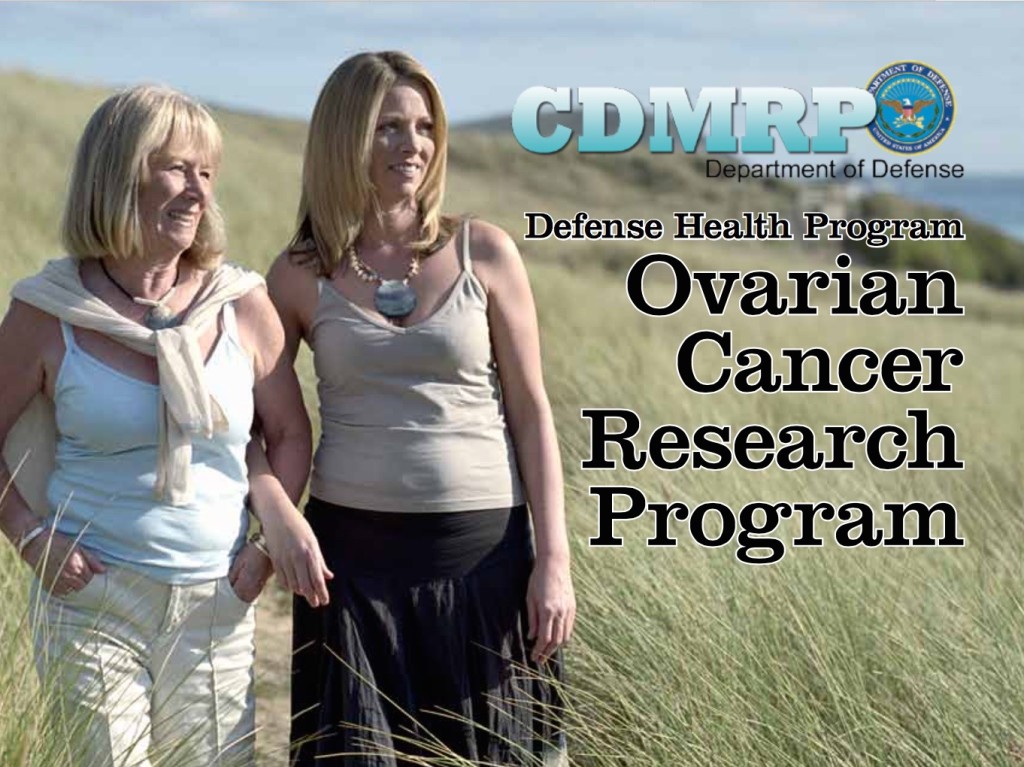With September’s Ovarian Cancer Awareness Month activities now behind us, efforts to discover the means for early detection and safer treatment options continue strong. As an ovarian cancer research advocate, I recently had the opportunity to serve on a scientific peer review panel as a consumer reviewer. Our purpose was to evaluate research proposals submitted to the Ovarian Cancer Research Program (OCRP) sponsored by the Department of Defense.
The Ovarian and Gynecologic Cancer Coalition/Rhonda’s Club nominated me into this program, and as such, I served as a full voting member, along with other prominent scientists and medical doctors, at panel meetings to help determine how the $20 million appropriated by Congress for Fiscal Year 2015 (FY15) will be spent on future ovarian cancer research.
Some of you may not be aware that the Department of Defense (DoD) is the largest sponsor of ovarian cancer research in the United States. This program originally started in FY97 and it currently provides $20 million in funding annually to further ovarian cancer research with the vision of eliminating ovarian cancer. The mission of the Ovarian Cancer Research Program is to support patient-centered research to prevent, detect, treat, and cure ovarian cancer.
The Department of Defense (DoD) Ovarian Cancer Research Program (OCRP) supports high-impact, cutting-edge research that fills unmet needs. The OCRP establishes priorities to target the most critical needs along the pipeline from basic to translational to clinical research and to push the field of ovarian cancer forward in their vision to eliminate this disease. Current research priorities include:
- Understanding the precursor lesion/stem cell, microenvironment, and pathogenesis/progression of all types of ovarian cancer including rare subtypes
- Developing or improving performance and reliability of screening, diagnostic approaches, and treatment
- Developing and validating models to study initiation and progression of ovarian cancer
- Addressing issues in primary prevention and survivorship
- Investigating tumor response to therapy including tumor survival, dormancy, cell death, clonal evolution, and tumor heterogeneity
- Enhancing pool of ovarian cancer scientists
I first learned of this program when I was actually in hospice with ovarian cancer. At the time, I remember thinking how much I wanted to serve in this capacity. However, because of my condition and the fact that my oncologist gave me one month to live, I did not think it would ever be possible. My condition had deteriorated to the point that I had a large bilateral pleural effusion, where both sides of my lungs collapsed and filled with fluid, creating a huge challenge to breathe.
Additionally, I had gone for close to 40 days without being able to consume anything solid and was subsisting physically only on freshly-made green vegetable juices, which would eventually become more difficult to drink due to the tremendous pain I would experience upon consuming anything. On top of all this, I was retaining fluid at a rapid rate, where towards what I thought would surely be the end for me, I would gain 10 pounds of fluid in just one day, making it impossible for me to move without significant pain and much-needed assistance.
When I reflect upon my recovery from this emaciated condition to the point now, where I could walk into the room and meet all the other scientists who would be serving alongside me on the panel to make a difference in the detection and treatment of this deadly disease, I give thanks to my Lord and Savior, Jesus Christ, who made this miracle possible.
Serving on the DoD Ovarian Cancer Research Program has been a dream come true as I represented the collective view of ovarian cancer patients, family members, and persons at risk for the disease. As members of the panel, we discussed the merits and impact of each proposal. At times, the discussion would become heated as one scientist would debate with another over a particular detail or subtle nuance in the microscopic world of cancer research and biology.
Ultimately though, we each innately sensed the connectedness of serving on the same team to ensure that the most promising areas receive funding for research, taking into full consideration the many lives the research would touch and affect. The opportunity to witness and partake in these impassioned discussions was inspiring, indeed, as it was reassuring and encouraging to know that there are so many brilliant scientists working on behalf of all who have been affected by this complex and unpredictable disease.
Ready to make your health a priority? Contact me here to schedule your consultation.

